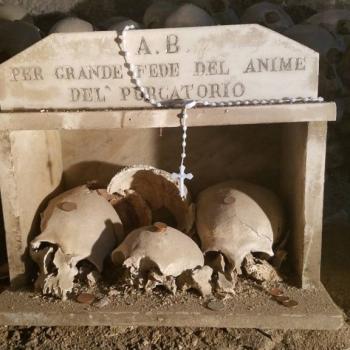Two of the best-known archbishops in the Anglican Church came out in favor of assisted suicide last month. One was former Archbishop of Canterbury, George Carey. The other was Archbishop Desmond Tutu of South Africa.
I have no doubt that both archbishops meant well, but unfortunately their announcements added little wisdom or nuance to the conversation. Both men appealed to their experience of walking through the final days of friends and parishioners, focusing more on their discomfort with the struggle of those who were dying, than they did on the dying themselves. Lord Carey inadvertently implied that the essence of Christian hope is freedom from pain and discomfort. It is not. It is about confidence in God whatever the circumstances. And Archbishop Tutu appealed to the importance of dignity, rather than say anything distinctively Christian about humankind.
One could have hoped for more. Both archbishops are spiritual leaders. They have played significant roles in their own churches and in the larger Anglican Communion. They are widely respected and they are supposed to play a significant role as the church's teachers. Or they should play such a role and therein lies the problem. They didn't teach. They made announcements that were simply used by people who favor legislation providing for assisted suicide.
No column-length essay can hope to resolve the issues at stake in the end-of-life debate, but hopefully the following observations will prove helpful. Consider it some of the teaching that I wish our leaders would do, instead of issuing position papers.
One: The preeminent value around human life in the Christian tradition does not rest on the notion of "human dignity." It rests on the conviction that human beings are made in God's image, that our bodies are "the temple of the Spirit," and that our lives are not ours but a gift from God. Each of these categories has an important place in Christian theology. They are complex, but less amorphous than the notion of dignity. They ground the value of human life in the creative work of God, rather than more subjective notions of what a dignified life or death might be. Thus grounded, the Christian understanding of human life safeguards not just those who are dying, but also the disabled and handicapped.
Two: From a Christian point of view then, there is a fundamental and moral difference between extending care and taking a life. The decision to continue or terminate treatment is one we make, thoughtfully, reverently, and in dependence upon the wisdom and mercy of God. That decision is also made in a complex arena that is shaped by treatment options, the larger prognosis, and the specifics of our own condition. By contrast the active termination of a life usurps a power that does not belong to us. The problem, then, with the position taken by Archbishops Carey and Tutu is that the laws they endorse cross that line.
Three: Far more complex end of life decisions would be avoided if we filed advanced directives and avoided a reflexive dependence on medicine in the name of avoiding death at all costs. Doctors know this, but they don't always make it clear to their patients out of fear that they will impose their views on those for whom they care. Consider these statistics: "In a survey of 765 doctors, [researchers] found that 64% had created an advanced directive—specifying what steps should and should not be taken to save their lives should they become incapacitated. That compares to only about 20% for the general public. …Why such a large gap between the decisions of doctors and patients? The case of CPR is instructive. A study by Susan Diem and others of how CPR is portrayed on TV found that it was successful in 75% of the cases and that 67% of the TV patients went home. In reality, a 2010 study of more than 95,000 cases of CPR found that only 8% of patients survived for more than one month. Of these, only about 3% could lead a mostly normal life. Unlike previous eras, when doctors simply did what they thought was best, our system is now based on what patients choose. . . . The result is that more people receive futile 'lifesaving' care, and fewer people die at home than did, say, 60 years ago." Arguably, then, assisted suicide fails to address the real issue, while courting moral disaster.
Finally: Avoiding pain and death are not preeminent Christian values. A good death is one faced in confident dependence upon God.





